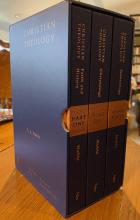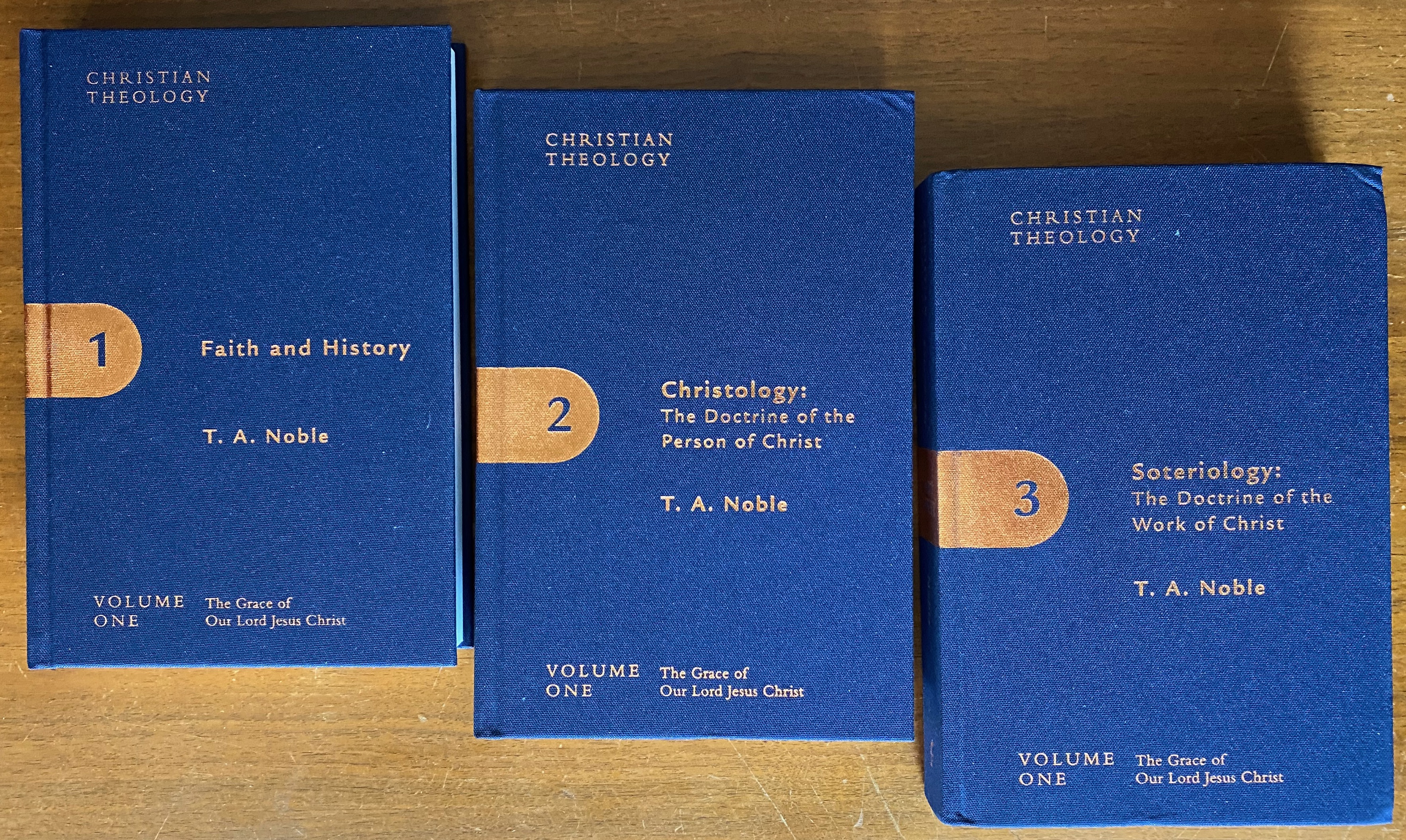Thomas A. Noble, The Grace of Our Lord Jesus Christ, vol. 1 of Christian Theology, 3 vols. (Kansas City, Missouri: The Foundry Publishing, 2022)
Footnote citations for individual parts:
Thomas A. Noble, Faith and History, Part 1 of The Grace of Our Lord Jesus Christ, vol. 1 of Christian Theology, 3 vols. (Kansas City, Missouri: The Foundry Publishing, 2022)
Thomas A. Noble, Christology: The Doctrine of the Person of Christ, Part 2 of The Grace of Our Lord Jesus Christ, vol. 1 of Christian Theology, 3 vols. (Kansas City, Missouri: The Foundry Publishing, 2022)
Thomas A. Noble, Soteriology: The Doctrine of the Work of Christ, Part 3 of The Grace of Our Lord Jesus Christ, vol. 1 of Christian Theology, 3 vols. (Kansas City, Missouri: The Foundry Publishing, 2022)
Footnote citation for the entire work:
Thomas A. Noble, Christian Theology, 3 vols. (Kansas City, Missouri: The Foundry Publishing, 2022, vols. 2-3 forthcoming)
Noble, Thomas A. The Grace of Our Lord Jesus Christ. Vol. 1 of Christian Theology, 3 vols. Kansas City, Missouri: The Foundry Publishing, 2022
Bibliography citations for individual parts:
Noble, Thomas A. Faith and History. Part 1 of The Grace of Our Lord Jesus Christ, vol. 1 of Christian Theology, 3 vols. Kansas City, Missouri: The Foundry Publishing, 2022
Noble, Thomas A. Christology: The Doctrine of the Person of Christ. Part 2 of The Grace of Our Lord Jesus Christ, vol. 1 of Christian Theology, 3 vols. Kansas City, Missouri: The Foundry Publishing, 2022
Noble, Thomas A. Soteriology: The Doctrine of the Work of Christ. Part 3 of The Grace of Our Lord Jesus Christ, vol. 1 of Christian Theology, 3 vols. Kansas City, Missouri: The Foundry Publishing, 2022
Bibliography citation for the entire work:
Noble, Thomas A. Christian Theology, 3 vols. Kansas City, Missouri: The Foundry Publishing, 2022, vols. 2-3 forthcoming
The publisher page offers downloadable PDFs for a detailed table of contents (Part 1 only), a sample section, and endorsements.
If purchasing direct from the publisher, use code CRTH at checkout for a 30% discount.
Identifiers: LCCN 2020003729 (print) | LCCN 2020003730 (ebook) | ISBN 9780834139480 (boxed set ; hardcover) | ISBN 9780834139220 (part 1 ; hardcover) | ISBN 9780834139244 (part 2 ; hardcover) | ISBN 9780834139268 (part 3 ; hardcover) | ISBN 9780834139237 (set ; ebook).
Note: Copyright 2022 (as indicated on the verso of each title page, for all three parts). But there is ambiguity: The publisher web page states February 1, 2023, as its "release date." Amazon indicates March 1, 2023 as its publication date. Our pre-ordered copy was received March 1, 2023. We may expect citations of this work to vary: some may use 2023 if they rely upon web sources, and others use 2022 if they rely upon the printed volume. (As of March 1, 2023, WorldCat currently indicates 2020, an error which will surely be corrected.) A date of 2022 is used in the citations above, consistent with the three title pages as printed.
Christian Theology will consist of three volumes:
- The Grace of Our Lord Jesus Christ (this volume)
- The Love of God (forthcoming)
- The Fellowship of the Holy Spirit (forthcoming)
The framework for the overall work thus reflects Paul's blessing: "The grace of the Lord Jesus Christ and the love of God and the fellowship of the Holy Spirit be with you all" (2 Corinthians 13:14). Noble writes: "Beginning with the revelation of God in Christ and the salvation he has graciously secured for us, we will try to articulate our knowledge as Christians of the Triune God of Holy Love, and finally come to express our understanding of ourselves and the world in the light the Holy Spirit gives us within the fellowship of the Church" (Preface, xiv).
In Christian Theology, Noble draws on major historical works of theology and contemporary scholarship to integrate biblical, historical, and systematic theology. He explains: "I have attempted to make this an 'integrative' Theology, integrating Biblical, Historical and Philosophical Theology within the framework of Christian belief given by Systematic or Dogmatic Theology. This also has to lead to considering the implications for Practical Theology. To attempt to integrate this wide range of theological disciplines runs the risk of textbook superficiality by making wide generalizations about 'movements' or 'schools' of thought. To avoid that, I have drawn on selected major works by Christian theologians and scholars. Substantial digests of major works, ancient and modern, are incorporated into the text making this something of a compendium..." (Preface, xv).
With volume one, The Grace of Our Lord Jesus Christ, Noble again adopts a three-part framework:
- Faith and History
- Christology
- Soteriology
Each part of this first volume is bound separately (pictured in a slipcase above).
Part 1, Faith and History, introduces Christian Theology, explaining why it begins with Christ. It also reviews what is known about Jesus historically and the faith in which he was brought up—the faith in the God of Israel. This part concludes with an examination of the resurrection of Jesus.
Part 2, Christology: The Doctrine of the Person of Christ, begins with theology as ‘faith seeking understanding’. It is faith in the Gospel that the crucified Christ is risen from the dead, and this faith in turn issues in the confession that Jesus Christ is ‘Lord’. From here, part 2 traces the logic of the Church’s development of Christology, the doctrine of the Person of Christ, from Scripture and, specifically, from the apostolic Gospel.
Part 3, Soteriology: The Doctrine of the Work of Christ, investigates the ‘Grace’ of God seen in the doctrine of the Atonement as an aspect of Christology.
Noble summarizes: "Part 1 is introductory and tackles the preliminary question of the relation of Christian faith to history. Genuine Christian Theology begins in Part 2, which is on Christology, the doctrine of the Person of Christ. From that point onwards each chapter begins with praise, normally some verses from the 'metrical Theology' of Charles Wesley. Part 3 is on soteriology, particularly 'objective' soteriology, that is, the doctrine of the Atonement. Part 1 is therefore suitable as basic reading for an introductory class in Theology (supplemented perhaps by a book on the creed). Part 2 is suitable for a semester-length course on Christology, and Part 3 for a subsequent semester-length class on the Atonement. It is also possible for the general reader to dip into chapters which are of particular interest. But the volume has one continuous line of argument and therefore only a sequential reading from Chapter 1 to Chapter 30 will give the reader the full benefit of that." (Preface, xvi)
Detailed tables of contents:
Abridged contents:
- Foreword, xi
- Preface, xiii
- General Introduction, xix
- Part 1: Faith and History
- A. The Study of Theology, 3
- Introduction, 5
- 1. Theology: A Brief History, 7
- 2. The Wesleyan Perspective, 23
- 3. The C0ntemporary Scene, 45
- 4. The Structure of These Three Volumes, 73
- B. Jesus of Nazareth: Historical Prolegomena, 89
- Introduction, 91
- 5. Jesus and the Method of History, 97
- 6. The Quests for the 'Historical' Jesus, 117
- C. Jesus the Christ: Historical Prolegomena, 139
- Introduction, 141
- 7. The Faith of Israel, 145
- 8. Jesus and the Story of Israel, 185
- 9. The Resurrection of the Messiah, 219
- Bibliography, 251
- A. The Study of Theology, 3
- Part 2: Christology: The Doctrine of the Person of Christ, 277
- Preface, vii
- Introduction, 279
- A. New Testament Christology, 293
- 10. Approaching New Testament Christology, 295
- 11. The Gospel of the Crucified and Risen Lord, 323
- B. Historical Christology, 351
- 12. The Christology of the Early Fathers, 353
- 13. Athanasius and the Nicene Faith, 381
- 14. The Christology of the Later Fathers, 405
- 15. Medieval, Reformation and Evangelical Christology, 439
- 16. Modernity's 'Liberal' Christology, 469
- 17. Evangelical, Nicene Christology Recast, 503
- C. The Doctrine of Christ, 541
- 18. Truly God and Truly Human, 543
- 19. One Person: The Lord Jesus Christ, 579
- Bibliography, 613
- Part 3: Soteriology: The Doctrine of the Work of Christ, 635
- Preface, vii
- Introduction, 637
- A. From Scripture to Doctrine, 647
- 20. Salvation: The Biblical Language, 649
- 21. The Word of the Cross, 689
- B. King, 717
- 22. Victorious King, 719
- 23. Liberation from the Enemy, 747
- C. Priest, 777
- 24. Self-Sacrificing Priest, 779
- 25. Anselm, Reformers and Evangelicals, 815
- 26. The Later Anselmic Tradition, 847
- 27. The Biblical Basis for the Anselmic Perspective, 875
- 28. The Lamb of God, 901
- D. Prophet, 937
- 29. The Unique Prophet, 939
- 30. Atonement in the Incarnate Word, 979
- Epilogue: Preaching the Word, 1015
- Bibliography, 1025
- Index of Ancient and Modern Authors, 1049
Thomas F. Torrance is discussed on pp. xv, 17, 50, 52, 60, 77, 248, 285, 373, 414, 525f., 548, 569, 572, 601-9, 611, 653, 668, 708, 725f., 729-31, 852, 871f., 915, 927, 984f., 1008f. See the Index for additional references in footnotes. James B. Torrance is discussed on pp. 654, 656.
- 531 views


